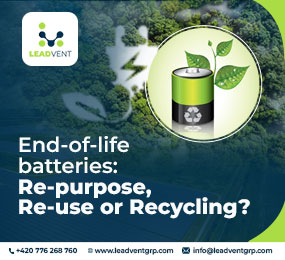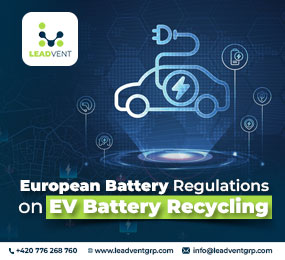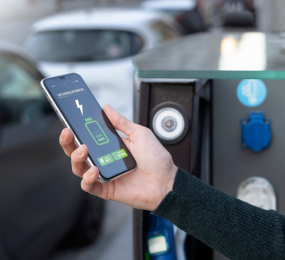Digital Data Traceability: How Innovators Are Preparing the Industry for Circularity
The automobile industry is at the moment on the verge of transition to a sustainable economy, and at its centre is circularity. The digital traceability with visions of the Battery Passport is beginning to define an essential element to make this vision a reality. Besides compliance, it also encourages efficiency and transparency for recycling and reuse relating to the topics of this technological innovation regarding the electric vehicle (EV) life cycle. The global market for electric cars currently has a compound annual growth rate, which is also known as a CAGR, of 23.1% to 2030, and, therefore, sustainability has become not only essential but mandatory.
What is a battery passport?
Battery Passport is a portable, digital record of informative data that pertains to the process of an electric vehicle battery. Such data comprises material content, source of acquirement, emissions, and other factors, and the ability to perform a given function. It's taking the battery life cycle from production to recycling to ensure all the stakeholders—manufacturers, recyclers, and consumers—make the right decisions to harness a value worth from the battery and minimise negative impacts on the environment. The Battery Passport complies with global sustainability objectives and guarantees efficient, ethical, and environmentally correct EV recycling.
The Importance of Digital Data Tracking for EV Recycling
Digital data traceability makes it easier to overcome the problems related to EV recycling. It offers the following benefits:
- Enhanced Transparency: Recycling firms can obtain more information about batteries to sort and recover some components, such as lithium, cobalt, and nickel, in an effective manner.
- Improved Efficiency: Inter-organisation automatic data exchange lessens the time and cost employed in manual inspections, making recycling processes more efficient and less expensive.
- Regulatory Compliance: Authorities around the world are increasing their controls over the recycling of used EV batteries. Cryogenic Emerging digital traceability helps in maintaining these standards besides offering evidence of compliance.
- Consumer Confidence: Straightforward recycling policies soothe consumers that their used EV batteries will be reclaimed and not disposed of in an environmentally unsustainable way.
Case Studies: Digital Data Traceability at Work
Case Study 1: Audi and Umicore Partnership
Audi, together with Umicore, a recycling company, has come up with a pilot project for tracking the components of EV batteries. By that, they were able to recycle at a 95% level strategic metals such as cobalt and nickel, which was a new record for the industry to emulate.
Case Study 2: Battery Regulation Initiative of EU
Europe’s battery regulation proposed by the EU will ensure that electric vehicle batteries housing these components have digital passports by 2027. This program is meant to increase recycling rates, establish ethical principles for sourcing materials, and highlight how policy and technology can be used synergistically in the transition towards circularity.
Join the Electric Vehicle Battery Recycling Conference
This inaugural forum will engage stakeholders in the electric vehicle technology space in discussions about new developments in the recycling of electric vehicle batteries and challenges and solutions thus far in advancing the circular economy in the battery industry. You will get to learn and connect with some of the best ev battery recycling companies out there and network with them.
This inaugural Congress will immerse all key stakeholders within the Electric Vehicles (EV) supply chains in discussions surrounding recent innovations in EV battery recycling while identifying and proffering solutions to current hurdles in creating a circular economy within the battery industry.
Key Highlights of the Event:
- Panel Discussions: The latest development in EV recycling, together with the implementation of the digital data traceability technique, will be discussed by such specialists.
- Case Studies: Best practices from leaders from the battery industry who have already implemented the Battery Passport approach.
- Networking Opportunities: Gain insights from leaders of the leading ev battery recycling companies and relevant authorities.
Event Details:
- Name: 2nd Annual Electric Vehicle Battery and Recycling Forum
- Date: February 26-27, 2025
- Location: Amsterdam, Netherlands
- Registration: Visit Leadvent Group to register.
This relevant forum provides professionals with the opportunity to learn about the outlook for the recycling of EV batteries, meet innovative technologies, and learn new rules for batteries in the EU. Thus, visitors will develop the agendas through the discussions of such sections as Circular Economy Promotion, Sustainable Procurement, and End-of-life Battery Issues.
The time is right for you to be among the earliest involved in the EV battery recycling market. Come to Amsterdam and get the best of learnings and connections and be part of the change towards sustainability.
Frequently Asked Questions on EV Recycling & Digital Traceability
Q1: What are the benefits of EV recycling?
Ans: The process enables the conservation of strategic materials for cyclic use; it is environmentally friendly besides improving on the circular economy.
Q2: How does the Battery Passport enhance recycling?
Ans: Battery recycling can be efficiently done because Deso offers necessary data on the battery composition, facilitating recycling.
Q3: What is the purpose of such events as the Electric Vehicle Battery Recycling Conference?
Ans: These events enhance partnerships and solutions because leading players from the sector are able to convene and discuss approaches to improve recycling solutions.
The New Face of Automotive Materials Circularity
It is crucial for the automotive industry because the historical record and opportunities for circularity are not simply present via the Internet of Things and the use case of a battery passport; they are inevitable. Proper material recycling, including differentiation and recycling, creates a foundation for sustainable developments across the global EV industry. It is beneficial to participate, hear new ideas, discuss them, and facilitate advancing towards the next status for the industry—the green tomorrow.












